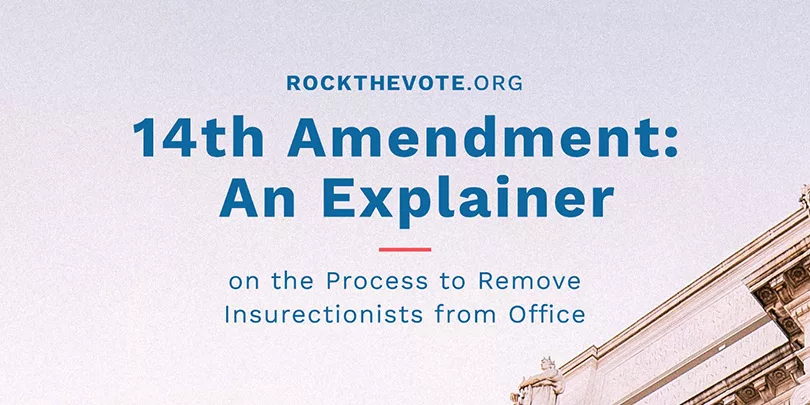The 14th Amendment and the Insurrection: An Explainer
Explainers: Constitution Government Legislation
What is the 14th Amendment?
Ratified in 1868, the 14th Amendment was the second amendment to the U.S. Constitution in the Reconstruction Era following the Civil War. It provided for the rights and protections for formerly enslaved persons; sought to address the rights of those involved in the rebellion against the United States; and established protections against future insurrections. Former Confederate states were required to ratify it to gain representation in Congress. As such, it included:
Section 1:
– The Citizenship Clause: Defined citizenship as all persons born or naturalized in the United States to include formerly enslaved people;
– The Equal Protection Clause: Established the principle that individuals in similar situations shall be treated equally by the law. The clause was largely created to address states with Black Codes;
– The Due Process Clause: Prohibited state and local governments from depriving persons life, liberty or property without a fair procedure;
– Privileges or Immunities Clause: Prohibited state and local governments from making any law that would limit the privileges or immunities of any citizen;
Section 2:
– Updated the formula for the reapportionment of Congressional seats so as not to count formerly enslaved people as three-fifths of a person, but did allow for disenfranchisement as a consequence of criminal conviction.
Section 3:
– Prohibited any federal or state elected, civil, executive, legislative, judicial or military official or member from engaging or giving aid or comfort to insurrection or rebellion efforts
– Provided Congress the power to remove person(s) with a two-thirds vote of each chamber
Section 4:
– Established that the federal government may use funds to stop a revolt
– Prohibited the federal and state governments from providing funds to help a rebellion
– Established all bills, obligations, and claims against the federal and state governments incurred in aid of insurrection or rebellion or in the loss or emancipation of enslaved people illegal and void.
Section 5:
– Gave Congress the power to enforce provisions of the 14th Amendment
Why are we talking about the 14th Amendment now?
Despite President Joe Biden’s decisive victory over incumbent President Donald Trump in the 2020 Presidential Election, President Trump and dozens of lawmakers spouted disproven conspiracy theories.
In the face of many failed attempts to overturn certified election results, President Trump and his allies in Congress presented the Congressional certification of the Electoral College votes as a last-ditch opportunity to overturn the election. On January 6, 2021, while Congress was actively certifying electoral votes, a violent mob of the President’s supporters broke into the U.S. Capitol. You can read more about this armed insurrection in Rock the Vote’s Statement on the January 6th Attack on the United States of America.
In the aftermath of January 6th, it became clear that several members of Congress “engaged in insurrection or rebellion” — exactly as defined in Section 3 of the 14th Amendment — through their rhetoric, promotion of conspiracy theories, and efforts to overturn the 2020 election. Section 3 of the 14th Amendment reads as follows:
“No person shall be a Senator or Representative in Congress, or elector of President and Vice-President, or hold any office, civil or military, under the United States, or under any State, who, having previously taken an oath, as a member of Congress, or as an officer of the United States, or as a member of any State legislature, or as an executive or judicial officer of any State, to support the Constitution of the United States, shall have engaged in insurrection or rebellion against the same, or given aid or comfort to the enemies thereof. But Congress may by a vote of two-thirds of each House, remove such disability.”
Subsequently, in a letter to her Democratic colleagues, Speaker of the House Nancy Pelosi noted the validity of calls to expel members of Congress who had engaged in sedition. The next day, Representative Cori Bush (D-MO) introduced a resolution to investigate, sanction, and possibly expel members of Congress who violated their oath of office.
Is there precedent for invoking Section 3 against insurrectionists?
Section 3 was devised to prevent future rebellions and to prevent former Confederate officials — or U.S. government and military officials that had supported the Confederacy — from holding public office in the reunified United States. This section provided a path toward accountability. However, in 1872, Congress passed a law that exempted most former confederate officials from the penalties outlined in Section 3. As a result, Section 3 was used sparingly during the Reconstruction Era.
Now, a century and a half after the Civil War, it still exists as a constitutionally-prescribed safeguard to hold our nation’s elected officials accountable in the gravest of situations.
So what does this all mean?
There are three important conclusions that can be made about the relevance of the 14th Amendment to the events of January 6th.
First, if Congress were to invoke Section 3 of the 14th amendment, lawmakers could be expelled from office through a supermajority (two-thirds) vote in both the House of Representatives and the Senate. There is debate about whether members could be expelled through a simple majority vote — rather than a supermajority vote. Supreme Court precedent, however, suggests that a two-thirds vote would likely be required for expulsion.
Second, accountability for members of Congress that helped to incite the attack on the U.S. Capitol is absolutely necessary. Finally, invoking Section 3 against these public officials is one way — a Constitutional way — to provide this accountability.
Read Rock the Vote’s official statement on the January 6th attack on the United States here.
Published January 26, 2021
